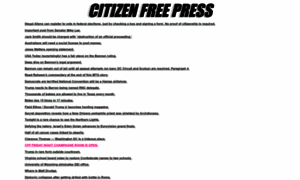
In the Czech Republic, Prime Minister Andrej Babiš owns a huge swathe of the country’s media outlets. And a priest who is very close with the government owns one of the other leading media companies, extending the government’s reach further still. With an audience of some 17 million, of a total Polish population of some 38 million, the state now has the ability to heavily control the news that nearly half the country consumes. In Poland, a state-run oil company bought up one of the largest media groups in the country, Polska Press, last year. But Hungary is not alone among those EU members that flout this basic right. And very many of them do, supporting rich and robust media environments that stand as examples for so many other countries around the world.
#ALL ABOUT CITIZEN FREE PRESS FREE#
It’s restricted in many countries – North Korea has no free press whatsoever, and doesn’t try all that hard to pretend otherwise Hungary pretends to have free press and is even legally bound to protect it, but now it has only a handful of independent media outlets.Īs noted, EU law compels EU member states to protect freedom of the press. For example, journalists aren’t free to report on issues that might compromise national security or reveal state secrets.īut perhaps a better way to look at this is by assessing undue limits placed on free press.
#ALL ABOUT CITIZEN FREE PRESS TV#
The more we discuss things, the better informed we become and the better able we are to make the best decisions about our future.Īre there legal limits of free press around the world?Įven in countries with a strong tradition of free press and a saturated, diverse media market, there are limits to what a journalist or newspaper or TV anchor can report. It creates more opportunities for us to hear other viewpoints or new information, and gives each of us the chance to impart our own opinions and understandings to others. Corruption, patronage, embezzlement, a quite regrettable weekend in Ibiza – it’s often the case that we learn of misdeeds by our representatives or other authorities only thanks to a society that protects freedom of the press.Īnd, of course, we want to discuss all this. As it’s not beholden to the government or other entity, or working in fear of them, a free press can give unvarnished reporting on politicians and others. A free press can give us the straight story on issues, policies and events because it’s not under the influence of the government or the prime minister’s golf buddies.Īnother function of a free press is that of a watchdog. In order for us to make informed choices when we pick our representatives or vote on certain issues, we need to know what’s actually going on. What is (or should be) the role of a free press in a democracy?Ī free press is a vital organ of a democratic society. In democracy, citizens delegate decision-making power to their elected officials, and a free press is one way to check on them. It delivers information to voters before they vote it fosters dialogue and debate to enrich understanding of this information and then it reports back to citizens about what their government is doing and if the things they wanted to happen are actually happening. And then they have to have a fair picture of what happens next - how the elected politicians or other decisions taken with the ballot worked out.Ī free press aids in every step of this process.

That’s because democracy’s strength rests in the hands of the people, meaning they have to be knowledgeable and informed in order to make the right decisions when they go to vote. Simply put, you can’t have much of a democracy without a free press. Why is freedom of the press so important? Its duty, in fact, is often to investigate people of power, and especially the government, to ask the hard questions and to attempt to uncover what’s really happening, regardless of the political fallout. The purpose of a free press is to ensure that the people are free to receive and impart information that is not manipulated or serving a particular person, entity or interest. In Europe, a free press is protected under Article 10 of the European Convention on Human Rights, and under Article 11 of the EU Charter of Fundamental Rights. Today, most democracies have some protection for a free press, whether this protection comes from a constitution or individual law. “Everyone has the right to freedom of opinion and expression this right includes freedom to hold opinions without interference, and to seek, receive, and impart information and ideas through any media regardless of frontiers.” Article 19 of the Universal Declaration of Human Rights codifies it along with the right free speech:

In modern history, a shared understanding of the principle of a free press was outlined by the United Nations in 1948.


 0 kommentar(er)
0 kommentar(er)
